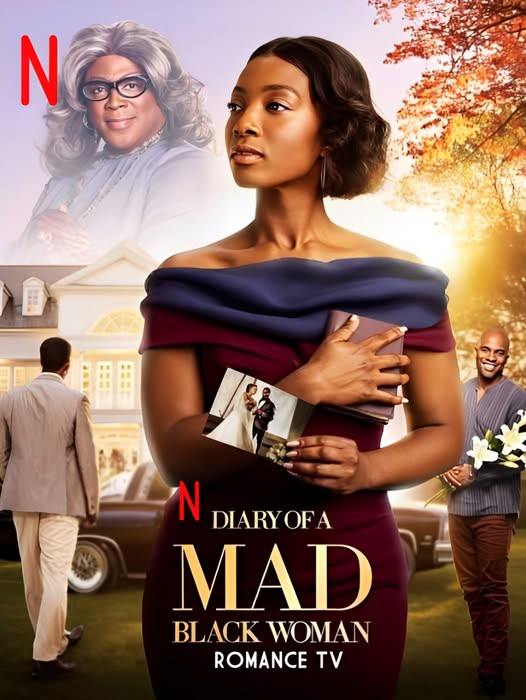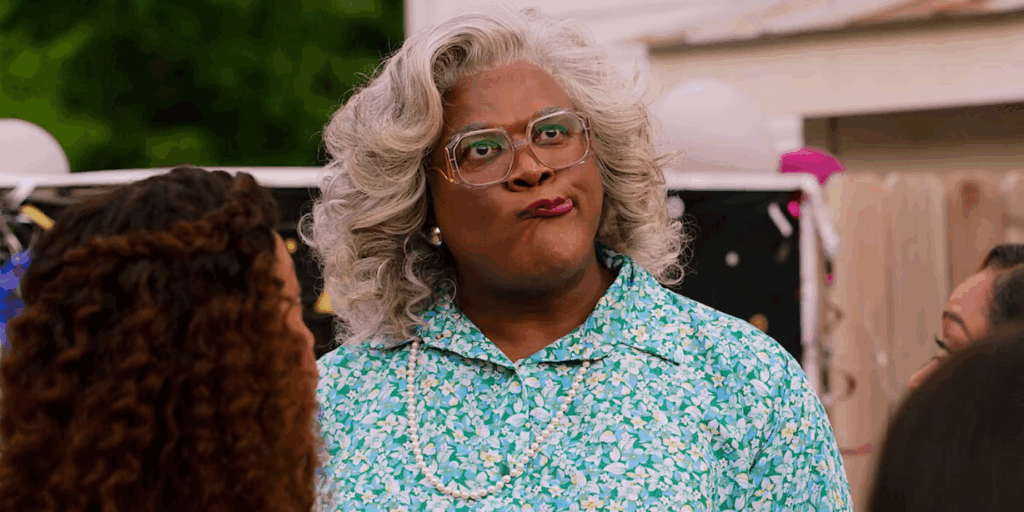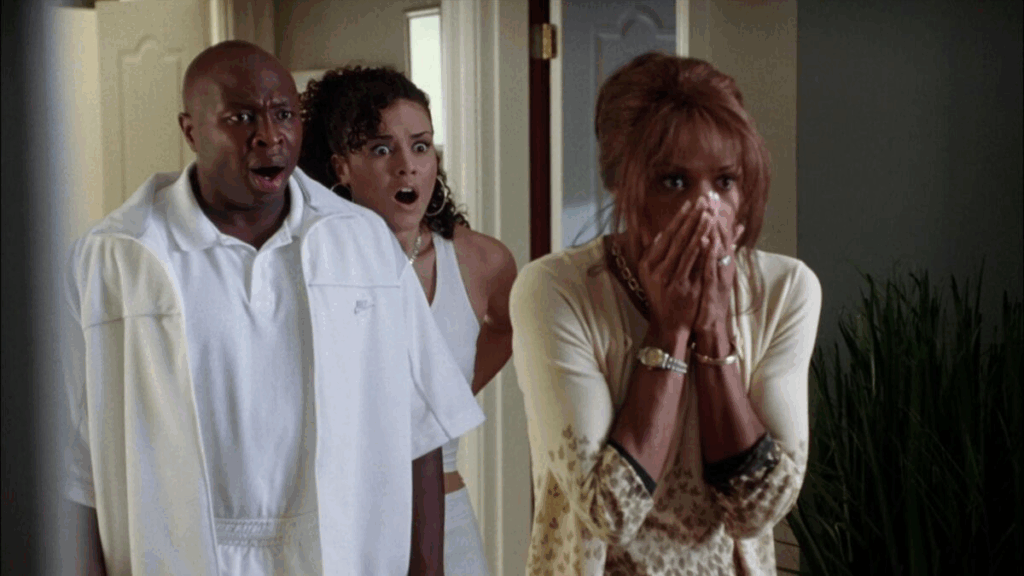Diary of a Mad Black Woman 2025

An Emotional Journey of Forgiveness, Female Empowerment, and Family Love
Overview
Diary of a Mad Black Woman is an American romantic dramedy that marked a turning point in Tyler Perry’s career and launched the globally recognized Madea film franchise. Directed by Darren Grant and based on the play and screenplay by Perry himself, the film tells the emotional story of Helen Simmons-McCarter, a woman betrayed by her husband who rediscovers herself through the support of family, faith, and a new love. Starring a powerhouse cast including Kimberly Elise, Steve Harris, Shemar Moore, Cicely Tyson, and Tyler Perry as the iconic grandmother Madea, the film grossed an impressive $50.6 million in North America on a modest $5.5 million budget. It became a cultural phenomenon, especially within African-American communities.

Plot Summary
The film follows Helen Simmons-McCarter (Kimberly Elise), a devoted wife seemingly in a perfect marriage with Charles McCarter (Steve Harris), a wealthy and powerful Atlanta attorney. On the night of their 18th wedding anniversary, Helen is shocked to discover Charles has been having an affair—and even worse, he coldly throws her out of their lavish home to make room for his mistress Brenda (Lisa Marcos) and their two illegitimate children. Devastated and directionless, Helen turns to her grandmother Madea (Tyler Perry), a tough, no-nonsense, yet humorous woman who lives with her brother Joe (also played by Perry), a mischievous, weed-smoking elder.
With support from Madea, her wise and devout mother Myrtle (Cicely Tyson), and Orlando (Shemar Moore), a kind-hearted truck driver, Helen begins a journey of rebuilding her life. She learns independence, confronts her pain, and reclaims her self-worth. When Charles suffers a life-altering accident, Helen faces a difficult choice: continue harboring resentment, or forgive the man who deeply wounded her? The film paints a vivid portrait of resilience, forgiveness, and the power of family love—interspersed with Perry’s trademark humor.

Character Analysis
Helen Simmons-McCarter (Kimberly Elise)
Helen is the emotional core of the film, symbolizing a strong woman rising from adversity. Her transformation from a submissive, dependent wife into a confident, self-reliant woman is one of the film’s most powerful arcs. Kimberly Elise delivers a stunning performance, especially in scenes confronting betrayal and in the deeply human moment of forgiveness. The scene where Helen stands before a mirror and affirms that she deserves love is both powerful and inspirational for many women.
Madea (Tyler Perry)
Madea is an iconic character: an older woman with a fierce, take-no-prisoners attitude who wouldn’t hesitate to use a gun or chainsaw to protect her family. While exaggerated and often comedic, Madea represents strength, protection, and unconditional love. However, the character has been controversial, with some critics arguing that she reinforces stereotypes about Black women.
Charles McCarter (Steve Harris)
Charles is the main antagonist—a symbol of betrayal and selfishness. Yet, his arc in the second half of the film offers a more nuanced portrayal of regret and redemption. Steve Harris effectively portrays the character’s downfall, eliciting surprising empathy as he transitions from arrogant husband to a broken man.
Orlando (Shemar Moore)
Orlando is the ideal romantic lead, offering Helen genuine support and love. Their relationship develops organically—from Helen’s initial mistrust to sincere affection—and becomes a bright spot in the narrative. Shemar Moore’s charm and sincerity make Orlando one of the film’s most beloved characters.
Myrtle (Cicely Tyson)
As Helen’s mother, Myrtle is a deeply emotional anchor, representing wisdom and spiritual grounding. Cicely Tyson gives a subtle, graceful performance, especially in the emotional church scene where she reminds Helen of the power of faith and forgiveness.
Cultural Context
Released at a time when mainstream films centered on African-American experiences were still scarce, Diary of a Mad Black Woman resonated deeply within the community. It addresses real-life issues such as gender inequality, familial pressure, and the role of Christian faith in emotional healing. Tyler Perry’s work blends comedy, drama, and spirituality—highlighting the richness of African-American storytelling.
The film also introduced the Madea persona—a drag-inspired character created and performed by Perry—adding boldness and humor to a traditionally conservative genre. This storytelling style would go on to shape Perry’s signature cinematic universe.

Highlights
- Powerful Performances: The film boasts memorable performances from its core cast. Kimberly Elise’s emotionally charged portrayal of Helen is especially praised, and Tyler Perry’s Madea is unforgettable for her bold comedic energy.
- Genre Fusion: It skillfully combines humor, drama, and spirituality, offering audiences both laughter and reflection.
- Inspiring Message: Themes of forgiveness, female empowerment, and familial love are communicated with heartfelt sincerity, making it an inspiring experience.
- Cultural Impact: More than just a film, it’s a cultural milestone that highlighted African-American perspectives and opened doors for new narrative forms in cinema.
Reception
- Critics: On Rotten Tomatoes, the film holds a 16% rating among critics, who cited tonal inconsistencies and over-the-top performances (particularly Madea) as weaknesses.
- Audiences: Viewers rated it at 66%, appreciating its blend of humor, heartfelt storytelling, and spiritual themes. Audiences praised its honesty and emotional depth.
Why You Should Watch It
Diary of a Mad Black Woman is a powerful choice for viewers interested in stories about women’s resilience, forgiveness, and the transformative power of love. With its mix of comedy and drama, it entertains while delivering meaningful messages about healing and faith. If you’re looking for a movie that’s funny, touching, and deeply human, this is a must-watch.

Parental Guidance
Rated PG-13 for drug content, mild violence (including gun and physical assault scenes), and some sexual references. While its themes of faith and forgiveness are family-friendly, parents should exercise discretion for viewers under 16–17 years old.
Conclusion
Diary of a Mad Black Woman is not just a movie—it’s a cultural event, particularly within the African-American community. Its commercial success helped usher in a new style of storytelling, highlighting unique Black experiences. The character of Madea, a larger-than-life matriarch, embodies both humor and strength, anchoring a story that continues to inspire audiences with its message of healing, lo
